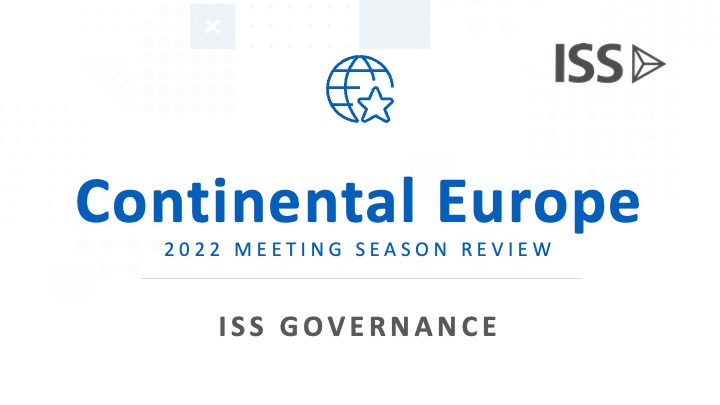Below are key takeaways from ISS’ recently released 2022 Continental Europe Proxy Season Review. The full report is available to institutional subscribers by logging into ProxyExchange then selecting the Governance Exchange and its Report Center tab and to corporate subscribers by logging into Governance Analytics then selecting the Governance Exchange and the Report Center tab.
- Climate-related proposals: A number of large companies put forward their first Say-on-Climate votes this year, despite the absence of formal regulatory frameworks on such votes. In most cases, this represented a vote on companies’ climate transition plans. However, considering the dissent observed in certain cases, it appears that shareholder expectations have increased regarding the completeness of data, targets, and corresponding strategies.
- Executive Remuneration: Realized pay broadly returned to pre-pandemic levels during the year, with many markets seeing variable payouts at or near maximums. Although underlying financial results improved significantly for many companies compared with the prior year, significant variation remains in terms of the level of transparency provided within remuneration reports across different European markets, and there were a number of high-profile cases of high shareholder dissent.
- Gender diversity: Gender diversity quotas and targets continue to evolve across European markets with more stringent requirements, as well as targeting both non-executive and executive directors. Significant developments in the level of average gender diversity were observed in certain markets, such as the Germanics, while outliers are becoming more isolated in others.
- Contentious discharge votes: There were a number of controversial discharge resolutions that sought shareholder approval of actions taken during the year. The controversies stemmed from a range of legal issues and concerns, such as breaching antitrust rules, settlements with authorities, and concerns regarding directors’ fulfillment of fiduciary duties, among other issues.
- Virtual meetings: Many companies continued to hold virtual-only general meetings for a third, consecutive year, where permitted by local legislation. In several markets, regulators have approved legislation concerning the future format of the general meeting, thus providing clarity following temporary provisions introduced in response to the pandemic.
If you are not a subscriber, please contact sales@issgovernance.com (for institutional investors) or contactus@isscorporatesolutions.com (for corporations) to learn more about accessing bespoke governance research.
By: European Governance Research




